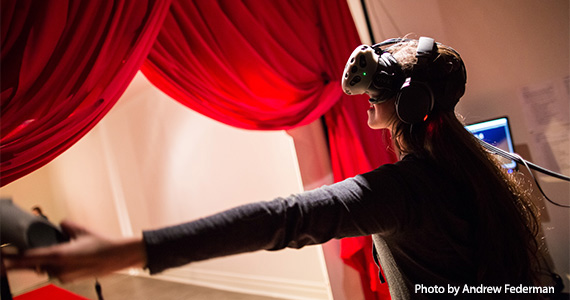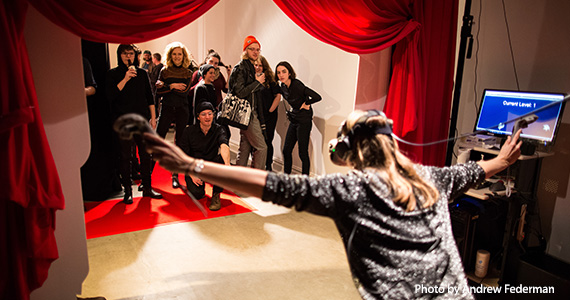As Professor Liat Berdugo’s favorite song played through her earbuds, she intently watched other listeners use their own headphones with a bingo card in hand. The Bingo card listed particular interactions listeners do with their headphones, exhibiting how society’s relationship with technology choreographs bodily gestures. The game was developed by one of the Davies Scholars students in this semester’s Davies Forum focusing on The Quantified Self. Professor Berdugo developed the topic with Professor Megan Nicely, of the Performing Arts and Social Justice Department, to explore how data self-collection consciously and unconsciously affects our movements, relationships, and networks.
Professors Berdugo and Nicely challenged this year’s Davies Scholars to examine how technology affects society in context of the Quantified Self movement. “We really are interested in having the students understand the intense connections between technology, technological objects, big data, the body and embodiment, and how big data works with the body,” explained Professor Berdugo. Scholars participate in detailed discussions, hear from guest lecturers, and experience artist installations to understand the quantified self ideology while working on projects to examine their own self-collection tendencies. Projects take a variety of forms, from participatory performances, such as a game of bingo, to videos and music production.
As an artist, Professor Nicely explained that self-quantification “calls out a disciplined way of working or showing up as an artist, and I thought: ‘that is something that I do, and really value’. I hadn’t thought of it tracking in this sort of way, but both are being accountable for yourself.” Leading this class has also prompted Professor Berdugo to reflect on how she quantifies her life, from counting steps on her phone to retaining files of her finances. Davies Scholars have the unique opportunity to critically discuss big data’s relationship to human interaction within the epicenter of the tech bubble, San Francisco. “I think there’s something quite radical about teaching anything related to technology the way we’re teaching it inside San Francisco. The tech industry tends to focus more on producing capital, producing apps, producing money, producing value. Our stance is more reflective. It’s more one that considers where is your data, who holds it, and why?” confessed Professor Berdugo. Scholars are not only challenged to think critically about how they utilize their collected data, but how they can intervene in these systems.
To demonstrate how technology can choreograph the body, artist Yehuda Duenyas will bring his interactive installation CVRTAIN to USF on November 9, 2017. The installation uses virtual reality to place participants on stage where participants are given the opportunity to interact with a virtual audience while onlookers act as a live audience. VR is a personal, isolating experience, but Duenyas’ installation encourages participants to share this experience. Professor Berdugo understood CVRTAIN’s design to comment on technology’s constraints. Most experience VR from watching others participate, as VR headsets are not accessible to all. Duenyas engages the participant and the audience together in the shared space, making a personal experience social.
USF students will have the opportunity to participate in the installation on Thursday November 9 in McLaren Conference Center room 252. A free public talk with a reception takes place from 5:00-6:30pm. RSVP for free tickets here.


